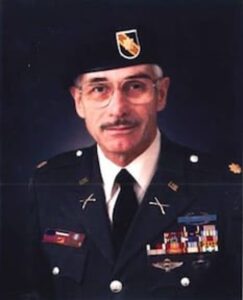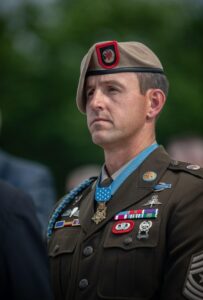 Today, October 26, is National Day of the Deployed. This is a day to honor, recognize, and raise awareness for the hundreds of thousands of deployed military members and their loved ones. There are currently two Medal of Honor recipients who, after receiving the nation’s highest military honors, continued their service. Major William D. Swenson of the U.S. Army and Master chief special warfare operator Edward Byers of the U.S. Navy.
Today, October 26, is National Day of the Deployed. This is a day to honor, recognize, and raise awareness for the hundreds of thousands of deployed military members and their loved ones. There are currently two Medal of Honor recipients who, after receiving the nation’s highest military honors, continued their service. Major William D. Swenson of the U.S. Army and Master chief special warfare operator Edward Byers of the U.S. Navy.
U.S. Navy SEAL Master chief special warfare operator Edward Byers has been in the service since 1998 and has since served 11 overseas deployments with nine tours of combat. He is the most decorated living U.S. Navy SEAL including the Medal of Honor and is currently serving as a master chief petty officer.
Byers was awarded the Medal of Honor for his heroic actions on the Hostage Rescue Force Team Member in December 2012 during Operation Enduring Freedom. Byers and his unit went by helicopter to eastern Afghanistan to rescue an American physician hostage and two Afghans who were captured by the Taliban. As they approached the targeted building, an enemy member spotted them and alerted the captors. Byers’ teammate, Petty Officer 1st Class Nicolas D. Checque entered quickly to try and neutralize the enemy and was fatally wounded. Byers rushed into the room right afterward to engage with the enemy – tackling and engaging in hand-to-hand combat. Chief Byers heard a voice respond to calls in English and ran towards the voice jumping on top of the American hostage – using his body as a shield from the intense fire in the small room. While covering and protecting the hostage with his body, Chief Byers immobilized another enemy guard – with his bare hands.
His citation ends, “His bold and decisive actions under fire saved the lives of the hostage and several of his teammates. By his undaunted courage, intrepid fighting spirit, and unwavering devotion to duty in the face of near certain death, Chief Petty Officer Byers reflected great credit upon himself and upheld the highest traditions of the United States Naval Service.”
U.S. Army Major William D. Swenson was in the service from 2002-2011 and then requested to return to active duty in 2013 and he was accepted to active duty in 2014 as a plans officer at the I Corps headquarters. He has been deployed three times in the War on Terror – once to Iraq and twice to Afghanistan. In addition to the Medal of Honor, he was awarded the Bronze Star Medal, the Purple Heart, and the Combat Infantryman Badge.
Swenson was awarded the Medal of Honor for his heroic actions in September or 2009 as part of an operation to connect the Afghan government with native village elders near the Pakistan border. On the morning of September 8, 2009, more than 60 armed enemy fighters ambushed Captain Swenson’s team as they moved by foot to the meeting with native village elders. Captain Swenson immediately returned heavy fire and called in artillery fire and aviation support while repeatedly calling for smoke to cover the withdrawal of the forward elements. Surrounded by enemy forces, Captain Swenson coordinated air assets, indirect fire support, and medical evacuation helicopter support of the wounded.
Captain Swenson ignored enemy radio transmissions demanding surrender and maneuvered uncovered to render medical aid to a wounded fellow soldier. Captain Swenson stopped administering aid long enough to throw a grenade at approaching enemy forces, before assisting with moving the soldier for air evacuation. With disregard for his own safety, Captain Swenson did not hesitate to lead a team into a kill zone using an unarmored vehicle, exposing himself to enemy fire multiple times – to recover and search for the wounded and four missing teammates. Using aviation support to find the locations of their fallen and wounded teammates, Captain Swenson and his team returned to the kill zone a second time, in a Humvee, to recover and save their comrades. Captain Swenson volunteered to exit the Humvee, exposing himself to enemy fire, to locate and recover three fallen Marines and one fallen Navy corpsman. He is noted for his exceptional leadership and stout resistance against the enemy during the six hours of continuous fighting that rallied his teammates and effectively disrupted the enemy’s assault.

Navigating the Darkest Night | The Courageous Leadership of Rear Admiral Bruce McCandless
Recipient: Bruce McCandless Branch: U.S. Navy Combat: World War II Sometimes fate has a way of showing us exactly where we need to be and


